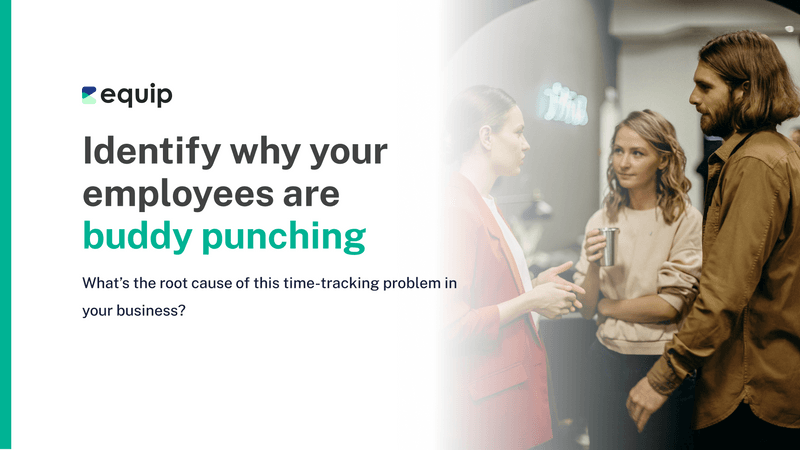
What Is Buddy Punching?
What do you think about giving your employees six extra weeks of vacation every year? Or increasing your gross payroll by 2.2%? Probably not something that makes you excited or that seems like a realistic increase in your business costs. Unfortunately, you could be one of the 75% of businesses already unknowingly funding it because of buddy punching.
Buddy punching is when an employee clocks in (i.e. punches in) for another when one of them isn’t at work. 6 weeks a year and 2.2% of gross payroll may sound exaggerated but that is the amount of time and cost the American Payroll Association found buddy punching costs employers.
How to Prevent Buddy Punching?
Buddy punching is time theft and it is illegal. The idea of stealing something intangible is often somewhat considered a negligible offense but every 30 minutes here and there adds up and has a clear effect on businesses. The rational question then is, how to go about preventing buddy punching.
There are various effective tools to reduce employees’ ability to clock in for each other. What they don’t do is increase trust and build a company culture where honesty is the norm. Time tracking systems are necessary, and in some countries a legal requirement, but should they be the one thing that’s giving business owners trust in their teams? If buddy punching is already occurring, or you think it’s occurring, perhaps considering why it’s happening in the first place is more important. Identifying the root cause of employees' buddy punching is a much more effective and sustainable approach.
Identifying Why Your Employees Are Buddy Punching
Is Your Leadership Fear-Based?
"Failing organizations are usually over-managed and under-led.” – Stephen Covey
What is the predominant leadership style in your business? This could be one of the key factors affecting why employees are bending rules and are okay even sharing with others that they’re bending the rules. After all, buddy punching does require a buddy.
One of the most common reasons employees will lie about their time at work is that they’re too scared to admit when they’re running late or when they need the time. To be honest, employees need to be given a space where they’re free of fear to tell the truth. Being scared is one of the most common reasons people lie.
If a fear-based leadership style is used, buddy punching is a lot more likely to happen. Bad morale, decreased overall trust and burnout are a lot more likely too. Years ago, fear-based leadership may have been the norm but in the world we live in today especially when managing younger generations, we just know it’s not effective. Punctuality and working the right amount of hours is not something you shouldn’t be enforcing but it’s the “how” about the enforcing that matters.
Do You Have a Transparent and Trusting Company Culture?
If you don’t have a transparent and trusting company culture, why? There are a variety of reasons this could be and buddy punching will be one of the symptoms of it. A healthy company culture requires trust and respect from the top down before leadership can expect trust and respect from the bottom up. If mistrust and a lack of transparency is felt by employees, it will result in leadership eventually feeling it from employees too. Transparency and trust, or the lack thereof, are always reciprocal.
Leadership is one reason for lack of transparency and trust but it’s not always the only, or primary, reason. Some people just aren’t trustworthy and unfortunately, people like this can become infectious in a team. Using psychometric tests, like the big 5, in your hiring process can help to avoid this in your team. There are contrasting opinions on using psychometric tests in hiring.
It’s important to understand whether this is an organizational problem or isolated to one group, one team, or one employee who is encouraging others. When someone is caught doing this, take relevant action to ensure that bad behavior isn’t ignored and allowed to spread.
Is Buddy Punching Easy to Do In Your Business?

With the reality that some people simply aren’t trustworthy, it needs to be accepted that some measures do need to be taken to ensure that time tracking is done effectively.
Common ways to reduce buddy punching are:
- Biometric clock in systems
- In-person check-ins (often at the start and end of the day)
- Installing cameras where clock-ins are done
- GPS or Geofencing (being able to track where someone is when they clock in)
- Time tracking software
- Education to address the seriousness of it (buddy punching IS illegal)
Making use of these solutions can easily reduce how easy it is for employees to steal time. But, most of your employees shouldn’t want to do it in the first place.
Humans are often judged to be opportunistic—any opportunity will be taken when it’s presented. But, human nature isn’t all bad and always being opportunistic is not a definitive fact. Many studies have been conducted to try to understand this and at best it can be said that it’s debatable whether most humans are opportunistic or not. Leadership styles, personality traits of specific employees, company culture, and opportunity are all factors influencing the likelihood of buddy punching.
Clear expectations and a culture of accountability can work wonders in curbing time theft. In demanding fields like construction, a time card app takes the hassle out of tracking hours, making clocking in and out more accurate. Paired with trust, these tools help reduce the urge for buddy punching.
The Why, and then the What of Buddy Punching
Identifying why your employees are buddy punching is more important than identifying how to practically stop them from doing it. A sustainable solution to buddy punching isn’t one solution, it’s identifying the cause and addressing that.
To successfully identify what is causing this in your business, you need to consider all of these:
- What is your leadership style?
- Do your employees feel that they can be honest?
- Do you have a transparent and trusting company culture?
- Do your leaders model good behavior for their teams?
- Are you hiring the right people?
Related: Can DISC Assessments Really Help Us Understand People Better?
